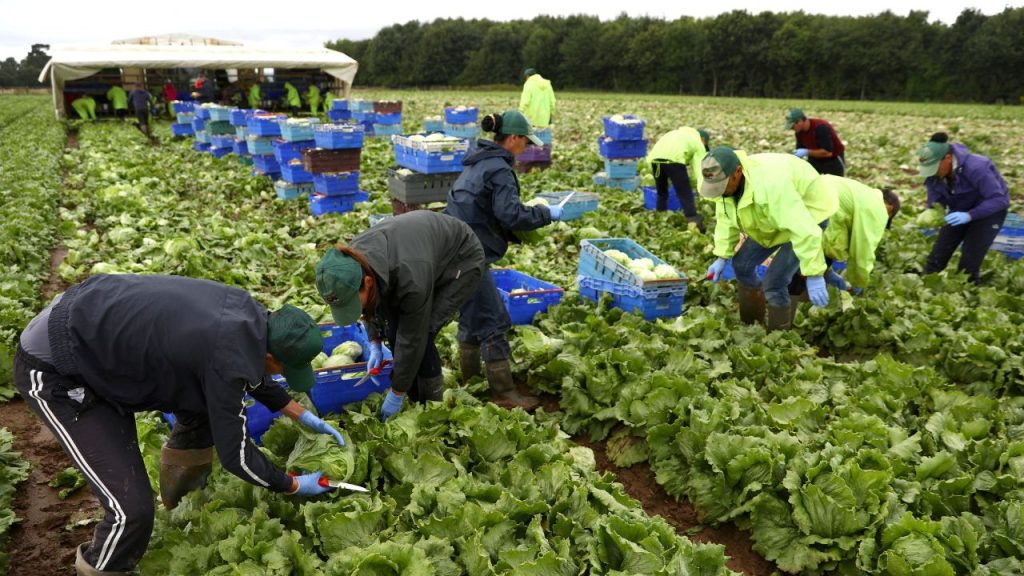The Causes of Labour Shortages
Labour shortages in British agriculture are the result of several interrelated factors:
1. Brexit and Changes in Immigration Policy
Brexit has had a profound impact on the availability of labour in the UK. With the end of free movement between the UK and EU, the agricultural sector lost access to a significant pool of seasonal workers, many of whom came from Eastern Europe. New immigration policies have made it more difficult for workers from the EU and other countries to enter the UK, leading to a substantial reduction in the number of available farmworkers.
2. The COVID-19 Pandemic
The COVID-19 pandemic further exacerbated labour shortages by disrupting travel and causing health concerns among workers. Lockdowns and restrictions on movement made it difficult for migrant workers to travel to the UK, while concerns about health and safety led some workers to opt out of seasonal work. This situation resulted in a severe shortfall of labour during critical periods of the agricultural calendar, such as harvesting.
3. Declining Interest in Agricultural Work
There has been a long-term decline in interest among UK residents in pursuing agricultural work. Factors such as low wages, physically demanding tasks, and the seasonal nature of the work have made it less attractive to domestic workers. Additionally, there is a growing skills gap, as younger generations are less likely to pursue careers in farming, leading to a shortage of skilled labour.
4. Increased Competition for Labour
The agricultural sector is also facing increased competition for labour from other industries. As the UK economy recovers and other sectors, such as construction and hospitality, rebound, agriculture struggles to compete for workers. These industries often offer higher wages and more stable employment, drawing workers away from agriculture.
Impacts of Labour Shortages on British Agriculture
The labour shortages in British agriculture have significant implications for the industry:
1. Reduced Crop Yields
One of the most immediate impacts of labour shortages is reduced crop yields. Without enough workers to plant, tend, and harvest crops, farmers are forced to leave produce unpicked, leading to significant financial losses. This not only affects farmers’ livelihoods but also contributes to food waste and impacts the overall food supply chain.
2. Increased Costs for Farmers
Labour shortages have driven up the cost of labour, as farmers are forced to offer higher wages and incentives to attract workers. This increase in costs can squeeze profit margins, particularly for small and medium-sized farms that may not have the financial resources to absorb these additional expenses.
3. Impact on the Supply Chain
The ripple effects of labour shortages extend beyond the farm. Disruptions in harvesting and production can lead to delays and shortages in the supply chain, affecting retailers and consumers. In some cases, this can result in higher prices for consumers and reduced availability of certain products on supermarket shelves.
Potential Solutions to Labour Shortages
Addressing labour shortages in British agriculture requires a multi-faceted approach. Some potential solutions include:
1. Expanding the Seasonal Workers Scheme
The UK government has introduced the Seasonal Workers Scheme, which allows a limited number of temporary workers to enter the UK for seasonal agricultural work. Expanding this scheme to allow more workers to participate and streamlining the application process could help alleviate some of the labour shortages. Additionally, ensuring that workers are treated fairly and have access to good working conditions is essential to attracting and retaining workers.
2. Investing in Automation and Technology
Automation and technology offer a long-term solution to labour shortages. By investing in machinery and technologies that can automate tasks such as planting, weeding, and harvesting, farms can reduce their reliance on manual labour. Innovations such as robotic harvesters and precision agriculture tools are already being used in some parts of the UK, and further investment could help scale these solutions across the industry.
3. Promoting Agricultural Careers
To address the declining interest in agricultural work, efforts are needed to promote farming as a viable and rewarding career option. This could involve:
- Educational Programmes: Developing educational programmes and apprenticeships that provide young people with the skills and knowledge needed for modern farming.
- Career Campaigns: Running campaigns that highlight the importance of agriculture and the opportunities available within the sector.
- Improving Working Conditions: Enhancing working conditions, offering competitive wages, and providing career development opportunities to make agricultural work more attractive.
4. Encouraging Domestic Workforce Participation
Encouraging more domestic workers to participate in agriculture could help reduce the sector’s reliance on migrant labour. This might involve offering incentives such as higher wages, better working conditions, and more stable employment opportunities. Additionally, providing training and support for individuals transitioning into agriculture from other sectors could help bridge the skills gap.
5. Strengthening Local and Regional Food Systems
Strengthening local and regional food systems could help to reduce the pressure on the national labour market. By encouraging shorter supply chains and more localised food production, the demand for seasonal migrant labour could be reduced. Supporting small-scale and community-based farming initiatives could also create more local employment opportunities.
Conclusion: Addressing Labour Shortages in British Agriculture

Labour shortages present a significant challenge for British agriculture, threatening the productivity and sustainability of the sector. Addressing this issue requires a comprehensive approach that includes policy reform, investment in technology, and efforts to attract and retain both domestic and migrant workers. By taking proactive steps to address labour shortages, the UK can ensure the long-term resilience of its agricultural sector and safeguard the nation’s food security.
